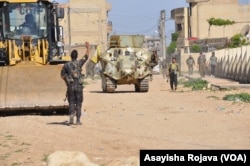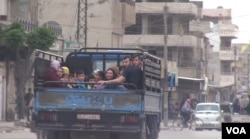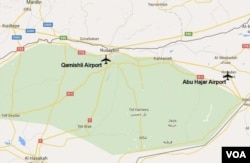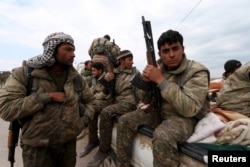Syrian government officials arrived Friday in Qamishli to try to negotiate a speedy cease-fire between Kurdish fighters and mainly Arab pro-Assad militiamen after the heaviest fighting in more than two years broke out Thursday.
Syrian Kurdish forces and government troops have lived in uneasy détente in the northeastern city of Qamishli, which Syrian Kurds consider their capital. Kurds have enjoyed considerable self-rule, with the Syrian government immersed in a civil war raging elsewhere in the nation.
At various times, though, the regime and the Kurds have assisted each other on the battlefield — mainly against the Islamic State terror group. But this February, the Kurds took advantage of a Russian-backed Assad regime offensive and grabbed villages north of Aleppo from U.S.-favored rebels.
Latest violence
The current fighting involves mainly the Asayish — the Kurdish security police — battling members of the National Defense Forces (NDF), a largely Iranian-trained militia made up of local Arab tribesmen loyal to President Bashar al-Assad.
Both sides fired artillery at the other for the first time since Assad forces withdrew from most of the city in 2012. Pro-government news sites claim Kurdish shelling damaged the city's national hospital.
Regular Syrian army soldiers, who oversee parts of Qamishli, avoided being drawn into Thursday's fighting. Government warplanes flew over areas of the city, although they did not launch airstrikes on Kurdish positions.
The armed clashes forced hundreds of Kurds to flee.
More fighting Friday
Government officials arrived as Kurdish police units threatened to mount an attack on Qamishli's government-controlled airport. An assault on the airport would risk involving regular government troops and the People's Protection Units (YPG) — the armed wing of the region's dominant political party, the Kurdish Democratic Union (PYD).
"Bullets were flying above my head in the street," said resident Akram Zave, who was wounded from a mortar rocket that hit his store in the city's main market. After being discharged from the hospital, he fled toward the neighboring town of Amude.
Fighting resumed Friday morning as Kurdish fighters took control of several government buildings and detained at least 50 pro-government troops in a military base.
"We don't know how many of them [government troops] have been killed. But the bodies of their killed fighters are still left on the streets," said Kurdish sniper Egid Qamishlo, who was positioned on top of a building recently taken from government forces.
VOA is one of the few outside media in the city as the fighting rages.
Cause unclear
The immediate cause of the clashes was unclear.
Some locals said fighting first erupted between the Asayish and members of the NDF at a checkpoint in a square demarcating a government-controlled area of the city. About a quarter of the city has remained in government hands since 2012.
Locals say the pro-Assad fighters sought to detain a Kurdish traffic policeman. Others contacted by VOA by phone and said the NDF shot at a passing Kurdish police patrol that refused to stop at the checkpoint.
According to local media reports, four people were killed in the initial firefight, which spread quickly to several other parts of the city.
YPG member Aras Xani tweeted Thursday, "The Asayish killed eight fighters of the regime-affiliated militia."
He said Kurdish fighters had surrounded several Assad government bases and were "deploying more and more special units in the clashes with the Syrian regime militia."
On Thursday, the Asayish overran Alaya prison, where they captured more than 60 government soldiers. That, in turn, provoked the NDF to launch an artillery barrage that left 20 civilians dead.
"The [Syrian] regime only wants to show that it is still relevant in this region," Ilham Ahmed, a Kurdish official, told Arta FM, a local radio station in Kurdish Syria.
Brewing tensions
Tensions have been brewing for weeks between Kurds and Arabs in Qamishli, and in Syria's Kurdish-dominated northeast.
A recent declaration by the PYD, a key U.S. ally in the fight against the Islamic State terror group, of a Kurdish federation in the north angered NDF leaders. Kurdish officials say pro-Assad militiamen have been eager to reassert the government's authority.
The U.S. views the PYD's armed wing, the YPG, as its most effective ground partner in the fight against the Islamic State. But the PYD's ultimate objective has been to carve out its own Kurdish homeland and establish self-rule. Most of the time, that has entailed avoiding clashes with the Assad government, which has been equally keen on preventing the Kurds from becoming full-fledged foes.
"This [fighting] could be a message from the Assad regime to the PYD that no matter how much support they receive from the U.S., they [Kurds] still can't be fully independent from Damascus," Kurdish affairs analyst Hosheng Ose told VOA.
Flare-ups, though, have occurred frequently in the past, predating the declaration of a Kurdish federation, as one VOA reporter discovered in 2013. On a trip to Qamishli, the Asayish confronted Syrian government troops and attempted to capture the reporter.
Nearly two hours of tense negotiations and the involvement of a local judge resolved the crisis without a firefight.
Shift in power?
"The Kurds are playing their own games to have their own state," Bassam Barabandi, a former Syrian diplomat who co-founded People Demand Change, an international development organization, told VOA recently.
Kurdish opportunism in February saw the YPG take advantage of a war-changing, Russian-backed Assad offensive across the northern Aleppo countryside, during which it seized several villages controlled by U.S.-favored anti-Assad rebels.
The rebels accused the YPG of coordinating militarily with the Assad government, an accusation the Syrian Kurds denied. But in parts of the northeast, especially in Al Hasakah province, Assad regime soldiers and YPG units have manned checkpoints jointly during offensives against the Islamic State.
Some analysts say the ongoing clashes in Qamishli may reflect a shift in the balance of power in northeast Syria, with Kurdish leaders increasingly confident they can push the government out of more areas of the city without incurring a forceful backlash from Damascus.
Both the government and Moscow have been increasing their courtship of the PYD and advocating for it to be included in the Geneva peace talks, which anti-Assad rebels have vociferously opposed.
With the help of the U.S.-led coalition, Kurdish YPG fighters have made significant gains against IS militants in many parts of north and northeastern Syria. But Kurdish leaders fear that an ongoing confrontation with Syrian troops will make their mission against IS more challenging.
"This is certainly a distraction from our fight against Daesh [IS]," one YPG commander, who requested anonymity, told VOA.
In the midst of the ongoing battles in Qamishli, IS claimed responsibility for a car bomb Thursday in the city, which killed more than a dozen people.
A pro-government news site argued Friday that the clashes may be the start of a more complicated relationship between Damascus and the PYD. As the Islamic State terror group is pushed out of more territory, the news site said, Kurdish leaders will be "incentivized to attack and fully capture Qamishli."
VOA’s Sirwan Kaijo contributed to this report.










